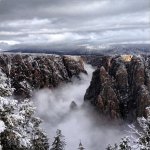
I should have posted this last week. From the Colorado Water Congress (Fiona Smith):
Gunnison Rancher Bill Trampe awarded prestigious 2015 Aspinall Award
The Colorado Water Congress awarded Bill Trampe, a life-long Gunnison Rancher and Colorado water advocate, the 2015 Wayne N. Aspinall “Water Leader of the Year” Award.
The Aspinall Award is given annually in recognition of a career of service and contribution to Colorado’s water community. It is awarded to a person who has dedicated a significant part of his or her career to the advancement of the state and its programs to protect, develop and preserve the state’s water resources.
Trampe is a pivotal and influential advocate for water use and water quality, known for his ability to develop consensus among ranchers, farmers and other water users. His many accomplishments, including his participation in the negotiation of the Colorado River Cooperative Agreement, prove that he inspires historic cooperation among municipal, industrial, and recreational interests. He was a key negotiator at the Colorado River Water Conservation District in the Black Canyon of the Gunnison reserved federal water rights case and the Colorado River Basin Proposal on water supply solutions.
Trampe was selected for the award by the previous Aspinall Award winners and Colorado Water Congress officers. John McClow, CWC Board President said: “Bill Trampe’s leadership and original thinking in water and agriculture have had a tremendous positive impact in our community and the entire state. His modesty, wisdom and tireless commitment to achieving the best result, even when there is strong resistance, inspires everyone who has the opportunity to work with him.”
About Bill Trampe
Bill Trampe is a third generation cattle rancher from the Gunnison/Crested Butte area. He attended Colorado State University and has been managing the family ranching business from 1967 to the present. Trampe served on the Board of Directors of the Upper Gunnison River Water Conservancy District and currently serves on the Colorado River Water Conservation District. He is a founding Director of the Gunnison Ranchland Conservation Legacy, a non-profit organization dedicated to the preservation of Gunnison Basin ranchlands.
About the Wayne N. Aspinall Award
The Colorado Water Congress presents the prestigious Wayne N. Aspinall Award annually to a Coloradan who has long demonstrated courage, dedication, knowledge and leadership in the development, protection and preservation of Colorado water – those attributes possessed by Mr. Aspinall. The late Wayne Aspinall, a lawyer and former member of the U.S. House of Representatives, remains one of the most influential water leaders in Colorado history.

